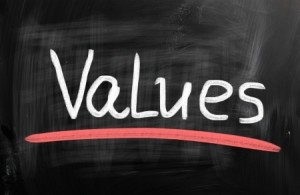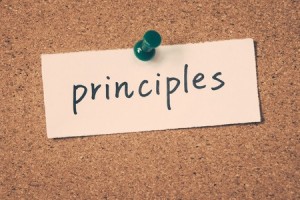Values. Principles. Beliefs. What’s The Difference?
 Many companies have stated Values. Some list a set of Principles. A few have itemized Beliefs.
Many companies have stated Values. Some list a set of Principles. A few have itemized Beliefs.
A few companies have both values and principles. While I haven’t yet encountered a company with both values and beliefs (or principles and beliefs), I suspect they exist.
Why mix terms?
Maybe they’re just trying to “cover their bases.” Or maybe they see a specific difference between these various concepts.
Whatever the reason, I believe this makes it very confusing for all stakeholders (customers, employees, shareholders, suppliers, and the community at large).
Let’s a take a quick look at all three concepts.
VALUES
 The term Values is the most common one, where leaders use these in four different ways:
The term Values is the most common one, where leaders use these in four different ways:
- Values define acceptable behavior. This is how most companies use values (and generally stop here).
- Values empower leaders to simplify and focus. Whether someone manages 10 or 10,000 people, every leader needs to be clear on a few top priorities in order to achieve key goals.
- Values set strategic direction. Values help all stakeholders understand what is produced or provided, how it gets done, who is involved, where it belongs, and when and why it matters.
- Values build competitive differentiation. Few do this at all, which happens to be my passion and focus: helping organizations identify and define differentiating values.
When Jim Collins wrote in his book Good to Great that Great organizations embrace values, in essence he was highlighting that they use values in all of these four ways.
Another way to think of values is that they are all about helping leaders determine and manage priorities.
PRINCIPLES
 When the topic comes up about ethics, then I think about principles. The best place to include a listing of principles is in a company’s Code of Business Conduct (COBC). It’s a governance issue. Principles are all about specifying, “how we behave here.”
When the topic comes up about ethics, then I think about principles. The best place to include a listing of principles is in a company’s Code of Business Conduct (COBC). It’s a governance issue. Principles are all about specifying, “how we behave here.”
Personally, I think you could take the list of 17 Common Values and turn them into a listing of principles, and then make this the COBC policy for a company. This document would then be made available for all employees and suppliers to read, with a copy placed under the “Governance” section of the company website.
BELIEFS
It’s interesting that many churches publish a Statement of Belief. It’s a way of saying to members, visitors, and even critics, “here is the lens through which we look at everything.”
The same can work for other organizations, including businesses.
A Statement of Belief helps stakeholders understand all decisions and behaviors through the right lens. Ideally, this is used in the recruitment of new employees to ensure all new additions to the team share in the same set of beliefs.
OK. Are you confused yet?
Here’s what is clear about these three concepts: there is no consistent use of these terms. Companies use the terms Values, Principles, and Beliefs interchangeably.
And worse, they mix them together.
Making It Worse
I’m always amazed (not in a good way) when I see a company with both stated values AND a listing of principles.
For example, consider the mix of values and principles at the following companies.
So at P&G, Respect and Innovation are principles, but not values? And what’s the difference between the value of Ownership and the principle The interests of the Company and the individual are Inseparable? Sounds pretty confusing to me.
Based on the three values of PepsiCo, it could be perceived that the primary corporate objective is to achieve “sustained growth” by having their “empowered people” act “responsibly”. If that is indeed the case, it’s not obvious. Then I suppose it could be viewed that the six principles describe HOW employees act responsibly. Yet, most other companies would classify these principles as values – as all of them are part of the 17 Common Values. This is only making the problem worse….
This third example is really confusing. If I were an employee of ConAgra, I’d want to understand the difference between Accountability as a value and as a principle. Why list it in both places? I’d also want to know if the principle of Collaboration relates to the value of Teamwork, or something else. And how does Simplicity relate to the remaining values, if at all?
It makes no sense to me why any company needs both values and principles.
But then to exacerbate the problem even more, imagine what happens when we add in the third concept of Beliefs.
Example of Stated Beliefs
It might surprise you that the #1 company on the Fortune 500 uses the term Beliefs.
Wal-Mart Stores has four stated beliefs:
- Service to our customers
- Respect for the individual
- Strive for excellence
- Act with integrity
 Now, I must say that I was surprised to see “Service” listed as one of the company’s beliefs. I’ve rarely experienced good service at any Walmart that I’ve visited. But then Simon Sinek describes this disconnect in his book Start With Why. Sinek states these beliefs were established by Sam Walton at the founding of his company in 1962. He goes on to say that Service really died in 1992 when Sam Walton passed away, and that much has changed inside the company since that time.
Now, I must say that I was surprised to see “Service” listed as one of the company’s beliefs. I’ve rarely experienced good service at any Walmart that I’ve visited. But then Simon Sinek describes this disconnect in his book Start With Why. Sinek states these beliefs were established by Sam Walton at the founding of his company in 1962. He goes on to say that Service really died in 1992 when Sam Walton passed away, and that much has changed inside the company since that time.
This is a good example of how Values, Principles, and even Beliefs don’t get updated or revised when the corporate culture changes. (Personally, I would recommend Walmart replace Service with Frugality, as this better attests to their current culture and value proposition).
Conclusion
Mixing the terms Values, Principles, and Beliefs is confusing.
Companies should use the most common term: Values.
Values need to be clearly defined so that everyone understands them and can apply them consistently.
Values need to be revised if the main value proposition and/or corporate culture changes.
Lastly, I personally believe that every organization would benefit from identifying and defining their differentiating values, because they focus all stakeholders on what is truly unique, they define a meaningful purpose, and they increase a company’s brand value. And most importantly they are core to creating a Great organization.












